What is Solidarity Agriculture (SoLaWi) and is there a SoLaWi near me? We have the definition and examples ready.
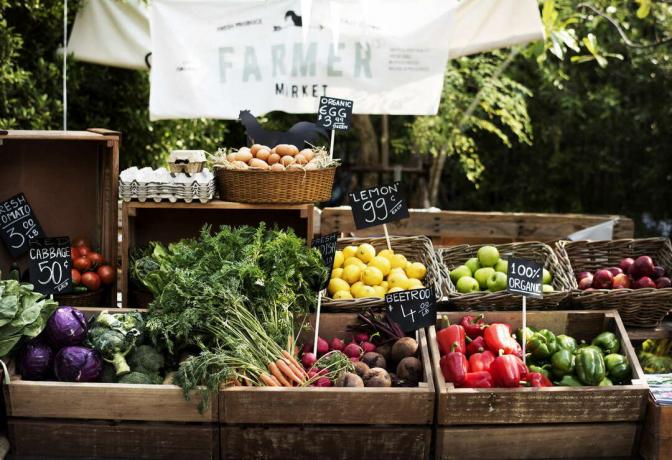
Solidarity farming is not just a way of farming and marketing agricultural products. Many advocates of this model also consider this form of farming to be the fairest and best. The number of supporters has been increasing rapidly for some time - in Germany as well as in Austria, Switzerland and many other countries. In this article we explain the concept of the SoLaWis in more detail and introduce the communities of some German cities.
contents
- Solidarity Agriculture: What is it?
- Solidarity agriculture: why does the concept exist?
- What is produced in a SoLaWi?
-
SoLaWi near me: Where are there SoLaWis in your area?
- SoLaWi near Bremen
- SoLaWi near Stuttgart
- SoLaWi near Augsburg
- SoLaWi near Hanover
- SoLaWi near Cologne
- SoLaWi Leipzig and Brandis (solidarity field economy association for food sovereignty and social utopias e. v.)
- SoLaWi Frankenberg/Saxony (courtyard to the colorful cow)
- SoLaWi Berlin (Kiez & Country)
- SoLaWi Berlin, Potsdam, Halle, Leipzig (Star Garden Odyssey)
- SoLaWi Munich (potato combine)
- SoLaWi Hamburg (Kattendorfer Hof)
- SoLaWi Dortmund (training farm Schulte-Tigges)
- SoLaWi Mainz
- SoLaWi Darmstadt
- SoLaWi Pforzheim
Solidarity Agriculture: What is it?
SoLaWi is the abbreviation for solidarity agriculture. It is a community made up of producers (e.g. farmers) and consumers. The concept is based on the solidarity that is already in the name: the consumers undertake to pay monthly or annual contributions in order to reliably cover the costs of the producers. In return, they are supplied by the producers with the products of their economy.
The price that consumers pay is set annually in most SoLaWis, the methods for determining the contribution can vary. Often, financially weaker members are enabled to become part of the community by being co-funded by the community. In some SoLaWis it is also possible to reduce the contribution to be paid by working hours. Voluntary community work is generally welcome in almost all SoLaWis and is often even indispensable.
The products produced are distributed differently in the various communities: vegetable crates or depots for collection are just two options. Due to the fixed payment of the producers, there are years with low agricultural yields intercepted, in return, the consumers are in years with very good yields at the more products involved.
Solidarity agriculture: why does the concept exist?
The SoLaWis concept avoids the otherwise usual "detour" via the retail trade, so that on the one hand the producers do not have to deal with all other producers have to compete on price and the consumers on the other hand a lower price for the products counting.
This may seem contradictory at first glance, but it can be explained by the fact that conventional retailers also keep part of the price for themselves in order to make a profit. In order to maximize these profits, people often buy as cheaply as possible - the same applies of course also for the wholesale trade and is generally a clear one in the free market economy action tendency.
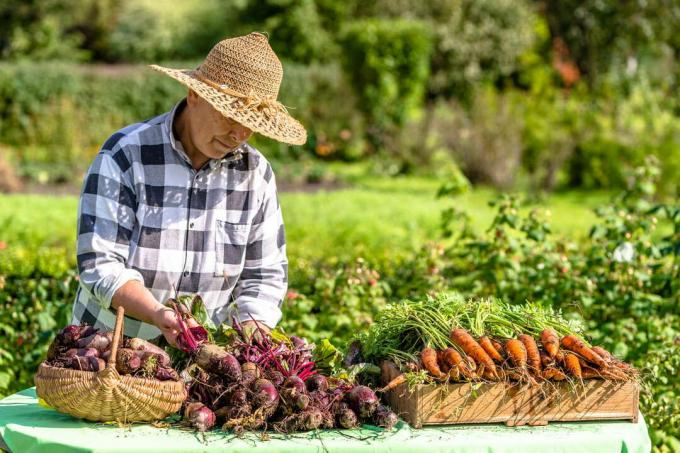
This leads to the producers trying to produce as cheaply as possible in order to also get a profit from their work. However, a very cheap production of food is often at the expense of the environment and leads to low wages for the employees of the producers.
Solidarity agriculture should be a fairer, regional, seasonal and mostly organic alternative to the usual trip to the supermarket. It should give the producers the opportunity to produce in financial security and at the same time considerate and sustainable with the environment, the areas used and their employees to deal with
What is produced in a SoLaWi?
Even if only one producer is involved in solidarity agriculture, the range is often very diverse. A varied crop rotation protects the soil and keeps it fertile. That, too, is only possible because it is not necessary to produce as cheaply as possible “at any price”. Because growing many different types of vegetables is much more labor intensive than concentrating on one type of vegetable.
Meadow orchards, cider factories and livestock farming are also often part of SoLaWis. This makes it possible to offer a wide range of products, from apples to eggs and good beef to zucchini.
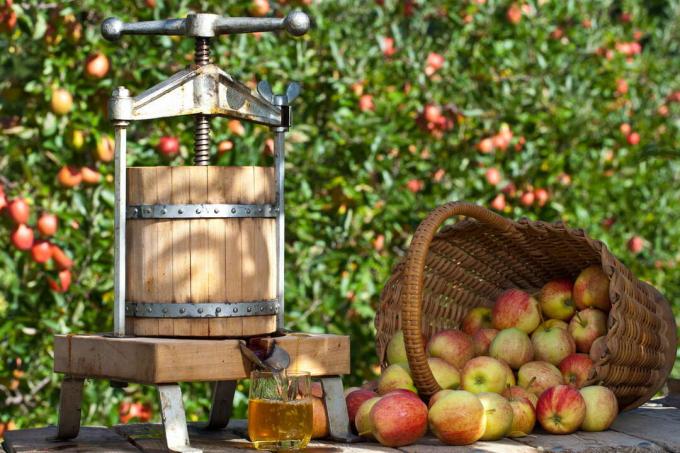
SoLaWi near me: Where are there SoLaWis in your area?
If you are now curious, you will find the presentation of some interesting SoLaWis below. There is sure to be one in your area.
SoLaWi near Bremen
the Gärtnerhof Oldendorf, located about 40 kilometers north of Bremen, produces vegetables, fruit and herbs in Demeter quality as part of a SoLaWi. All products are distributed exclusively to members of the community, none of the products go to retail. The community of consumers around Bremen and Bremerhaven is supplied via weekly stocked depots. On the one hand, the weekly letter, which continuously reports on what is happening on the farm, ensures additional proximity to the producers. On the other hand, hands-on activities are regularly organized so that the origin of the food on the farm can be experienced directly. At the annual circle festival, getting to know each other, forming a community and enjoying it are the focus.
SoLaWi near Stuttgart
The SoLaWi Stuttgart in cooperation with the Reyerhof Möhringen produces agricultural products organically and naturally without genetic engineering. Their vision is not limited to the purely practical: exchange and cooperation should replace competitive thinking. For this it is necessary that vital resources such as water, soil and food as well as education and knowledge are regarded as common goods. Following this approach, the SoLaWi Stuttgart offers a platform for open communication, lectures and workshops. Balanced prosperity should grow from this attitude, which does not conflict with an intact and sustainably managed ecosystem. SoLaWi Stuttgart is also looking to future generations: manage well today so that you can continue to draw from nature's garden in the future.
SoLaWi near Augsburg
The SoLaWi Augsburg a total of four producers with many consumers around Augsburg. The initiative received the “Augsburg Future Prize” in 2017. The organization of the SoLaWi is something very special: The members are divided into "farmers" and "town farmers". While the farmers produce products for themselves and the city managers, they take care of public relations, joint projects and recruiting new members, for example.
SoLaWi near Hanover
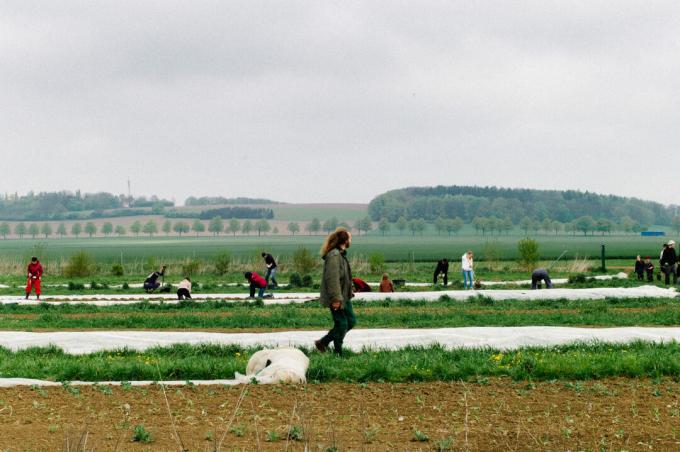
About 20 kilometers west of Hanover, on the site of a former tree nursery, it thrives SoLaWi "wild growth". In 2010 and 2011, the site was turned into an organic nursery by the siblings Arne and Meike Wessel restructured and since then organic-vegan cultivation has been practiced here, which means: Not even animal fertilizers are used here used. The farm includes outdoor areas, four foil tunnels for heat-loving crops and two meadow orchards. The products produced, spread over the year there are over 40 different vegetable crops, can be picked up either directly from the farm or from depots. In the SoLaWi "wild growth" cooperation is welcome, so that the management is a real community effort. At the annual general meetings, the budget is discussed in detail, as is the cultivation plan, in which all employees have a say.
SoLaWi near Cologne
In the west of Cologne lies the still very young SoLaWi “Vegetable Coop”, which – although it has only existed since spring 2017 – supplies 180 people in Cologne with regional, seasonal and organically grown vegetables. The financing of this SoLaWi is very interesting: While ongoing operations are paid for by monthly membership fees, crowdfunding, endowment funds and Subsidies responsible for covering special costs, for example if a new area of activity is developed or a new bicycle is purchased for the delivering employees shall be. In addition, each member pays a contribution to the vegetable cooperative upon joining, which is repaid if the member wishes to leave the community. With this "credit" plannable and larger purchases are made, such as machines or the expansion of workspaces.
Since a detailed presentation of all too many SoLaWis would go beyond the scope of this article, we will now briefly present a few projects from all corners of Germany:
SoLaWi Leipzig and Brandis (Solidarische Feldwirtschaft- Association for Food Sovereignty and Social Utopias e. v.)
In the SoLaWi Leipzig and Brandis there is a lot of collaborative work, learning and trying out. So that all members can participate in the new findings, everything is reproduced on the well-structured website. An initiative that looks like fun, a thirst for knowledge and a willingness to learn.
SoLaWi Frankenberg/Saxony (yard to the colorful cow)
The SoLaWi in Frankenberg/Saxony offers a wide range: They not only run an FÖJ position, but also a BuFDi position and a training position. The farm is also a member of the WWOOF association. The farm "zur Bunten Kuh" is therefore a recommendation for anyone who would like to try out the concept of solidarity agriculture for themselves.
SoLaWi Berlin (Kiez & Country)
the SoLaWi "Kiez & Country" has networked with an organic nursery in Mecklenburg-Western Pomerania, which supplies three districts of our capital with vegetables on a weekly basis (twice a month in winter).
SoLaWi Berlin, Potsdam, Halle, Leipzig (Star Garden Odyssey)
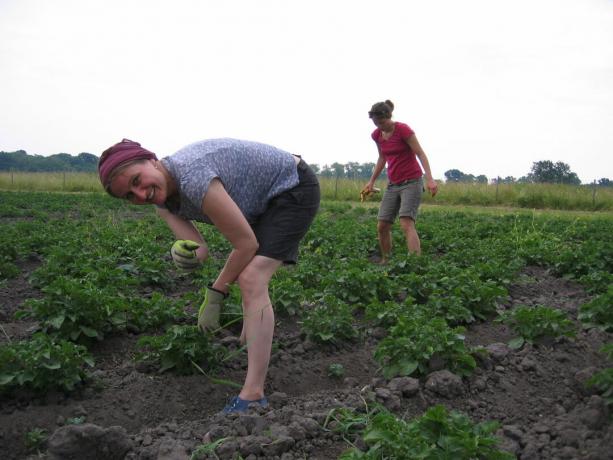
As consumers of today, we are all part of complex economic contexts that entail large-scale social injustice and environmental degradation. The members of "Star Garden Odyssey" think it can be done better. That is why they have developed a form of cooperation that they find fair and that is based on a sustainable approach to nature. They organize a joint cultivation plan, organize a variety of work assignments that teach them understanding and respect for agricultural work. The courtyards thus become meeting places. This is where the sense of responsibility arises, with which the members shape their project.
With everyone who has the courage to join the Sterngartenodyssey, a common path is taken to show that fair treatment and sustainability are wanted and feasible.
SoLaWi Munich (potato combine)

The potato combine was founded by Daniel Überall and Simon Scholl. After two moves, however, the cooperative now has a home in the form of a former one Found a tree nursery that was converted into an organic vegetable farm (certified by Naturland Fair). became. The site was funded jointly and with this move and in hopeful anticipation of what the The future that SoLaWi will bring is the supply of many Munich residents with healthy, regional and seasonal vegetables secured.
SoLaWi Hamburg (Kattendorfer Hof)
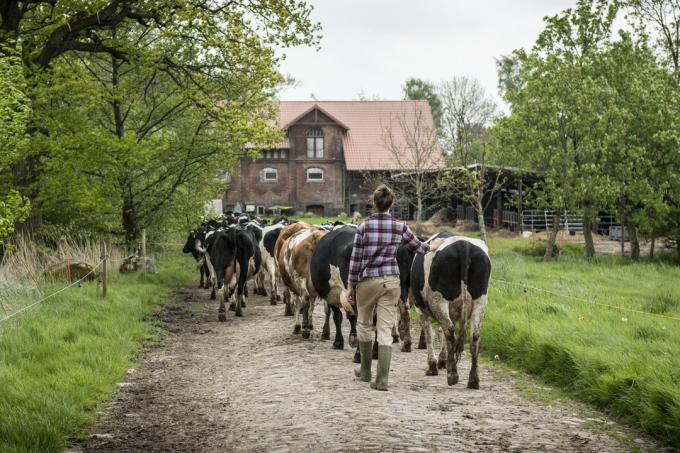
the Kattendorfer Hof near Hamburg has been operating according to Demeter guidelines since 1995. Here, according to Rudolf Steiner's ideas, farming is largely done in cycles in order to maintain and increase the fertility of the 240 hectares cultivated. With the help of the so-called "FoodCoops" and the farm shop, the products produced - grain, vegetables and animal products such as cheese, quark and eggs - are distributed to consumers. The "FoodCoops" organize the distribution of the products themselves and also provide them Premises ready for storage, so that the Kattendorfer Hof does not have its own for each customer have to pack boxes.
SoLaWi Dortmund (Schulte-Tigges learning farm)
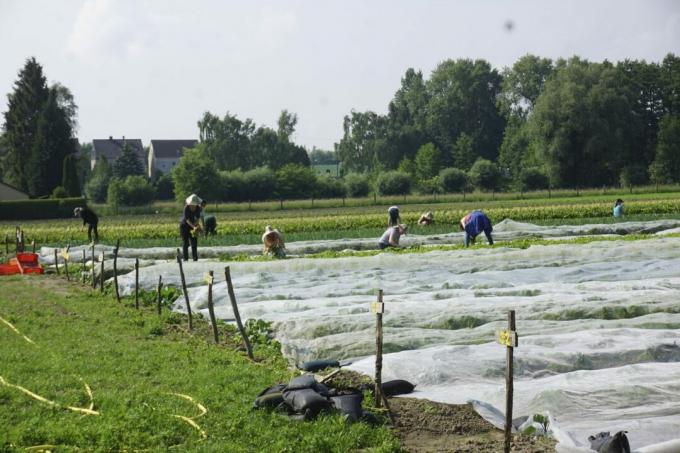
the Schulte-Tigges educational farm has been managed as SoLaWi since waking up from a slumber of several years. Since then, it has also been a “hands-on farm” for children and young people who can get hands-on and do it themselves gain playful access to the topics of agriculture, nutrition, consumption, climate and the environment should.
SoLaWi Mainz

Out of the desire to eat healthy and ecologically independently of corporations, catalyzed by the information event “The state needs new townsfolk” finally developed after two years of initiation the SoLaWi Mainz. With the help of professionally experienced and helpful gardeners, a project has now developed that is is able to distribute 105 shares of vegetables per month and its own land, storage locations and machines cared for.
SoLaWi Darmstadt
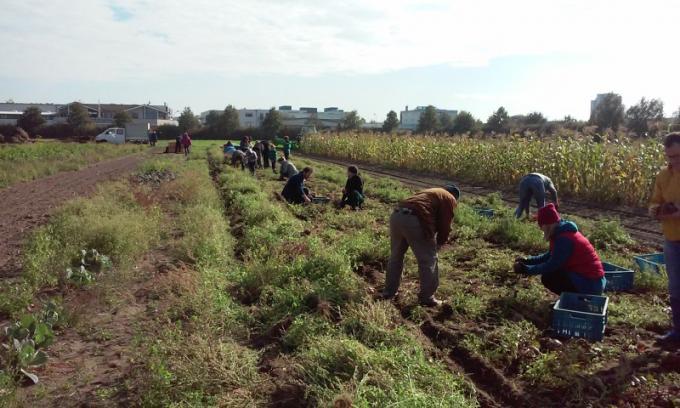
It has existed since 2011 SoLaWi Darmstadt, which can now provide for 80 members with the help of the nearby Birkenhof. In working groups, a lot is put together on the basis of voluntary work. The cultivation on the Birkenhof is not affected, it is denied independently of voluntary help. However, the summer festivals, public relations work, maintenance of the depots and the website are carried out by the community on their own initiative.
SoLaWi Pforzheim
The SoLaWi Pforzheim works in cooperation with the Auenhof, which employs several gardeners, social therapists and 18 employees with a need for assistance. In this way, another social aspect is introduced into the idea of solidarity agriculture, in which every member of the community has an important place and achieves something within their means can.
If there is no SoLaWi in your area in this comprehensive list, then take a look at the official website of solidarity agriculture drop by to find a start-up initiative or a SoLaWi for yourself.
...and receive concentrated plant knowledge and inspiration directly in your e-mail inbox every Sunday!
